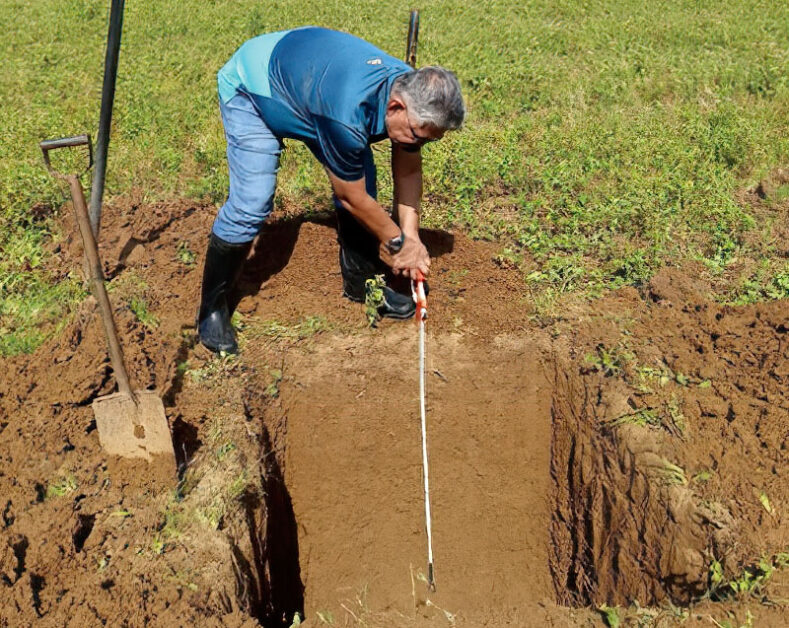SAN FRANCISCO, Agusan del Sur (MindaNews / 6 November) – Top officials in Agusan del Sur are pushing forward in their efforts to enhance soil health development, integrating it as a crucial element of the province’s centerpiece Upland Sustainable Agriforestry Development (USAD) program.
 Agusan del Sur Gov. Santiago Cane Jr. digs soil samples in a farmland in the province sent to Griffith University in Australia for scientific soil analysis that would determine the kind of crops suited for the area. Photo courtesy of USAD
Agusan del Sur Gov. Santiago Cane Jr. digs soil samples in a farmland in the province sent to Griffith University in Australia for scientific soil analysis that would determine the kind of crops suited for the area. Photo courtesy of USAD
The initiative aims to bolster the agricultural productivity of farmers in this landlocked province.
An Australian delegation, led by the Australian Centre for International Agricultural Research (ACIAR), arrived here on October 11 for an in-depth review of the USAD program.
The visit, featuring Australian Deputy Ambassador to the Philippines James Yeomans, Dr. James Quilty, the chief scientist of ACIAR, and Australian Embassy Political Second Secretary Alexander O’Hara, marks a step ahead in implementing the Memorandum of Understanding (MOU) between the Philippines and Australia.
The MOU focuses on a “National Soil Health Strategy” that seeks to elevate production levels within the country’s agricultural lands.
Second District Rep. Adolph Edward Plaza believed that the MOU aligns harmoniously with the USAD program, which he conceived while he was governor in the aftermath of Typhoon Pablo in December 2012.
Today, the USAD program stands as the cornerstone of the provincial government’s poverty alleviation program.
USAD was recognized in the Galing Pook Awards 2021 as one of the Top 10 Outstanding Local Governance Programs in the country.
This acknowledgment was awarded for its best practices in empowering farmers in hinterland areas to become more productive in a sustainable manner, through the implementation of appropriate technological interventions and by fostering partnerships with stakeholders for development.
Following Governor Santiago Cane Jr.’s presentation at the provincial capitol, Yeomans expressed his appreciation, noting that despite the challenges, progress has been made in the USAD program
Representatives Plaza and Alfelito Bascug (Agusan del Sur, first district) recently filed House Bill No. 3489, which seeks to establish the Upland Sustainable Agroforestry Development (USAD) program throughout the country, replicating the one being implemented in Agusan del Sur since 2013.
Plaza and Bascug believed that the program would help improve the lives of poor farmers in the hinterlands, who have to contend with limited access to funds, knowledge, technology, and the market.
The local officials are optimistic that the visit to the proposed Provincial Soils Laboratory at the Capitol complex and the Sustainable Provincial Agro-Forestry Resource Center (SPARC) in Bayugan City will leave a positive impression on the visiting Australian officials, making the USAD program a model for the five-year research collaboration on soil and land management between the two countries.
The Provincial Soils Laboratory, expected to be completed in 2025, will be staffed by soil chemists, soil microbiologists, and agronomists. A significant transformation is also planned for the 43-hectare SPARC, which will showcase agricultural innovation in farm technologies, economic impact, engineering, and tourism.
The provincial government has already sent approximately 5,000 soil samples from 500-meter grid samples and experimental areas for soil nutrient analyses to Griffith University in Australia.
This initiative is part of ACIAR’s partnership with the USAD program, which also includes facilitating three provincial government scholars to study in Australian universities to enhance their knowledge of soil science.
Cane emphasized the strong advocacy for soil health that has been developed through the partnership with ACIAR via the USAD program, gaining support from both the executive and legislative branches of the provincial government.
From 2013 to 2022, the USAD program had invested P771 million, with ACIAR co-investing P80 million in research and technical support, and the municipal government units with P97.2 million.
Plaza has been at the forefront of promoting soil test-based fertilization after discovering the lack of technical expertise in soil management at the Department of Agriculture’s Bureau of Soils and Water Management.
He recognized the urgent need for scientific soil testing, especially when farmers in Agusan del Sur who are beneficiaries of the USAD program continued to experience low production despite being taught proper farm technologies. (Chris V. Panganiban / MindaNews)